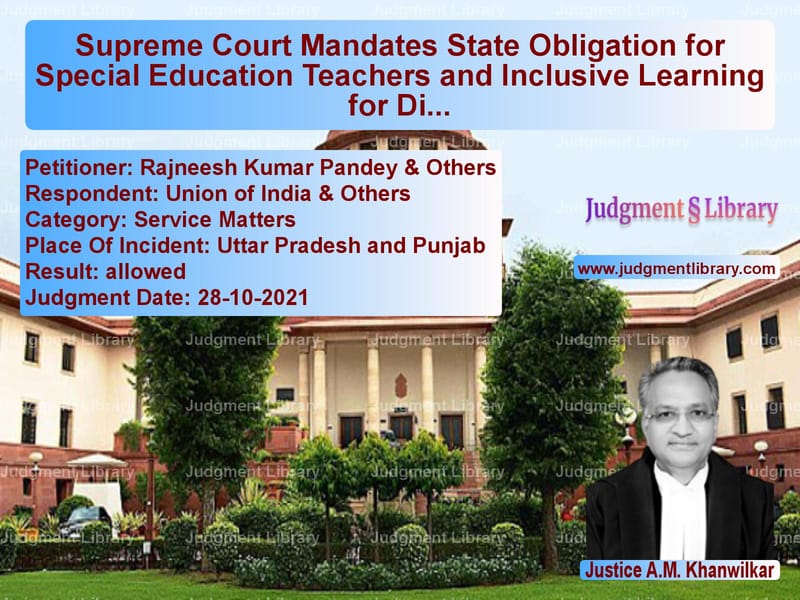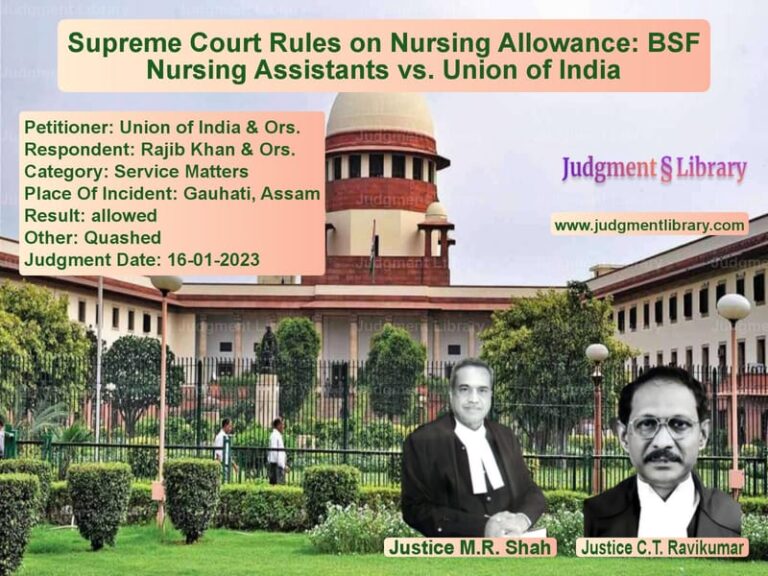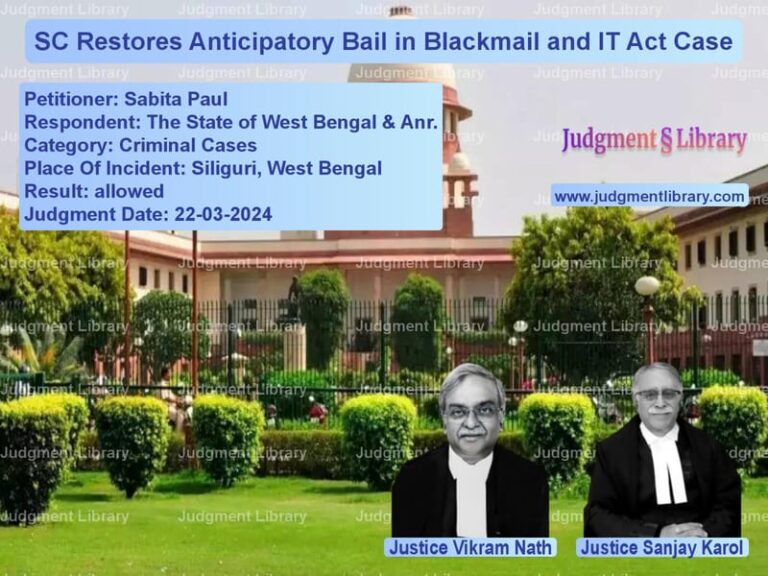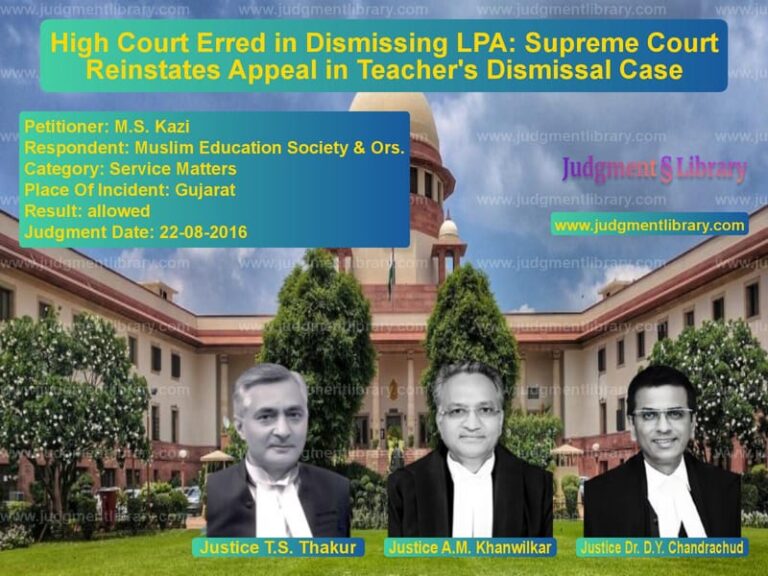Supreme Court Mandates State Obligation for Special Education Teachers and Inclusive Learning for Disabled Children
The Supreme Court of India, in a landmark judgment, addressed the systemic deficiencies in special education for children with disabilities (CwSN). The case, Rajneesh Kumar Pandey & Others vs. Union of India & Others, underscored the constitutional and legal obligations of the state to provide inclusive education, recruit special education teachers, and ensure that disabled children receive their right to education under the law.
This judgment highlights the importance of compliance with Article 21A of the Constitution and relevant laws such as the Rights of Persons with Disabilities Act, 2016, and the Right of Children to Free and Compulsory Education (RTE) Act, 2009. The case involved petitioners seeking the appointment of trained special educators and the enforcement of proper teacher-pupil ratios for children with special needs.
Background of the Case
The case was filed by a group of petitioners, including educators and advocates for children with disabilities, alleging that the government had failed to meet its obligations to provide sufficient numbers of qualified special education teachers in schools across India. The petitioners highlighted that:
- The state had not adhered to the prescribed teacher-pupil ratio of 5:1 for children with disabilities.
- There was a severe shortage of trained special educators in both government and private schools.
- Repeated representations to the authorities had not led to meaningful reforms or appointments.
- The failure to recruit permanent special educators had resulted in the deprivation of fundamental rights guaranteed under Article 21A.
Petitioners’ Arguments
The petitioners contended that:
- The shortage of special educators had led to a violation of the fundamental right to education for children with disabilities.
- The government had an obligation under the RTE Act, 2009, and the Rights of Persons with Disabilities Act, 2016, to provide inclusive education.
- Current government policies failed to adequately address the needs of children with autism, cerebral palsy, deafness, blindness, and other disabilities.
- The failure to implement the required teacher-pupil ratio had resulted in schools failing to accommodate disabled students.
- There was no proper monitoring mechanism to ensure the recruitment and retention of special educators.
Respondents’ Arguments
The respondents, including state governments and educational authorities, defended their position by arguing that:
- They had initiated steps to recruit special educators in compliance with statutory mandates.
- Infrastructure improvements for special education were ongoing, including the establishment of inclusive schools.
- The financial burden of hiring full-time special educators at every school needed careful consideration.
- Existing policies were sufficient to accommodate children with disabilities, and ongoing recruitment efforts would address the shortfall.
Key Findings of the Supreme Court
1. The Right to Education for Disabled Children is a Fundamental Right
The Supreme Court reaffirmed that access to education for children with disabilities is a fundamental right guaranteed under Article 21A. The Court stated:
“The right to free and compulsory education under Article 21A cannot be diluted for children with disabilities. The state has an affirmative obligation to ensure the availability of special educators and an inclusive learning environment.”
2. Teacher-Pupil Ratio Must Be Maintained
The Court emphasized the importance of maintaining the mandated teacher-pupil ratio of 5:1 for children with disabilities, stating:
“The prescribed teacher-student ratio must be adhered to in all educational institutions to ensure that children with disabilities receive the attention and support they require.”
3. State Governments Must Take Immediate Action
The Court directed state governments to:
- Ensure the recruitment of sufficient numbers of trained special educators.
- Conduct regular audits to monitor compliance with education laws.
- Improve infrastructure to support inclusive education, including transportation, assistive devices, and learning materials.
4. Amendments in Recruitment Norms
The Court also instructed the central government to issue necessary notifications to amend recruitment policies to ensure a sufficient supply of trained special educators in both government and private schools.
Read also: https://judgmentlibrary.com/supreme-court-upholds-union-of-indias-decision-on-ias-cadre-allocation/
Judgment and Conclusion
The Supreme Court allowed the petition and issued directives for systemic improvements in special education across India. The key takeaways from the ruling include:
- The state must comply with the prescribed teacher-pupil ratio and recruit adequate special educators.
- The government must take immediate measures to improve infrastructure and support for children with disabilities.
- Special educators must be appointed on a permanent basis to ensure continuity in inclusive education.
- The government must provide adequate resources, including assistive technology and transportation for disabled students.
This landmark judgment reinforces the fundamental rights of children with disabilities and holds the government accountable for providing quality inclusive education.
Judges: The judgment was delivered by A.M. Khanwilkar.
Petition Result: Allowed
Petitioner Name: Rajneesh Kumar Pandey & Others.Respondent Name: Union of India & Others.Judgment By: Justice A.M. Khanwilkar.Place Of Incident: Uttar Pradesh and Punjab.Judgment Date: 28-10-2021.
Don’t miss out on the full details! Download the complete judgment in PDF format below and gain valuable insights instantly!
Download Judgment: rajneesh-kumar-pande-vs-union-of-india-&-oth-supreme-court-of-india-judgment-dated-28-10-2021.pdf
Directly Download Judgment: Directly download this Judgment
See all petitions in Employment Disputes
See all petitions in Recruitment Policies
See all petitions in Public Sector Employees
See all petitions in Education Related Cases
See all petitions in Judgment by A M Khanwilkar
See all petitions in allowed
See all petitions in supreme court of India judgments October 2021
See all petitions in 2021 judgments
See all posts in Service Matters Category
See all allowed petitions in Service Matters Category
See all Dismissed petitions in Service Matters Category
See all partially allowed petitions in Service Matters Category







